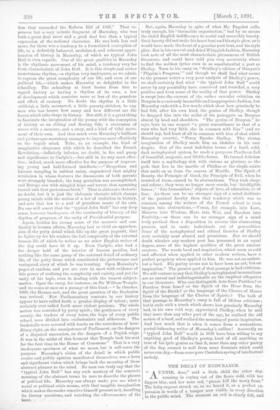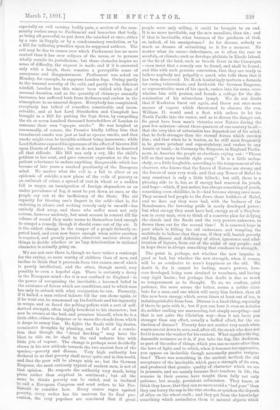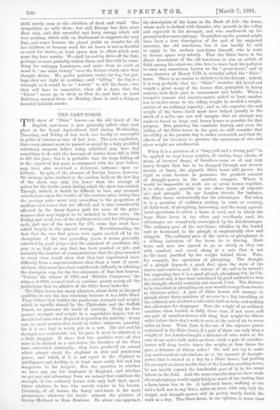THE DECAY OF ENDURANCE.
" AUNTIE, dear," said a little child the other day, running in crying out of the fierce cold, with her fingers blue, and her nose red, "please kill the nasty frost." The baby-request struck us, as we heard it, as a perfect ex- pression in words of a temper now visible in every direction in the public mind. The moment an evil is clearly felt, and especially an evil causing bodily pain, a section of the com- munity rushes away to Parliament and beseeches that body, as being all-powerful, to put down the mischief at once, either by a vote in Supply, or by a condemnatory resolution, or by a Bill for inflicting penalties upon its supposed authors. The evil may be due to causes over which Parliament has no more control than it has over eclipses of the moon, or to persons wholly outside its jurisdiction ; but those obstacles inspire no sense of difficulty, the request is made, and if it is answered only with a laugh, there remains a perceptible sense of annoyance and disappointment. Parliament was asked on Monday, for example, to suppress London fogs. Owing partly to the unusual severity of the cold, and partly to the deficient rainfall, London has this winter been visited with fogs of unusual duration, and as the quantity of chimneys annually increases, has suffered both from darkness and carbon in the atmosphere to an unusual degree. Everybody has complained, everybody has talked of remedies, conceivable and incon- ceivable, and at last Lord Stratheden and Campbell has brought in a Bill for putting the fogs down, by compelling the six or seven hundred thousand householders of London to consume their own "opaque smoke." He was laughed at consumedly, of course, the Premier kindly telling him that translucent smoke was just as bad as opaque smoke, and that smoke might even be invisible without being innocuous; while Lord Selborne exposed his ignorance of the effect of his own Bill upon Courts of Justice ; but we do not know that he deserved all that ridicule. His Bill was only a cry, like the child's petition to her aunt, and gave concrete expression to the im- patient reluctance to endure anything disagreeable which has become of late years a marked peculiarity of the European mind. No matter what the evil is, a fall in silver or an epidemic of suicide, a new phase of the evils of poverty or an outbreak of crime, a spread of rust in wheat or a sudden fall in wages, an immigration of foreign slopmakcrs or an undue prevalence of fog, it must be put down at once, or the people cry out at the inefficiency of the State. The old capacity for blowing one's fingers in the cold—that is, for enduring in silence and seeking remedy only in oneself—has entirely died away, and those who suffer must not only scream, however uselessly, but must scream in concert till the volume of sound they make seems to themselves loud enough to compel a remedy, though it should come out of the air. It is the oddest change in the temper of a people formerly re- puted hard, and even now bravo enough when active exertion is required, and greatly puzzles observers anxious above all things to decide whether or no many deterioration in national character is actually going on.
We are not sure there is, though we have rather a contempt for the crying, as more worthy of children than of men, and incline to think that it proceeds from two causes, one of which is purely intellectual, and the other, though moral, may possibly be even a hopeful sign. There is certainly a decay in the European mind—for it is not confined to England—in the power of recognising the inevitable, a lessened belief in the existence of forces which are. conditions, and to which man has only to submit with what resignation he can. Formerly, if it hailed, a man retired indoors till the sun shone again, or if he went out, he summoned up his fortitude and his ingenuity in wraps, and so faced the pelting pellets with a sort of self- derived strength, often highly beneficial to his character; but now he swears at the hail, and promises himself, when he is a little older, either to disperse or to warm the clouds from which it drops to annoy him. He fights the floods with big drains, terminates droughts by planting, and is full of a convic- tion that though the "dread fire-king" may have the blast to ride on, he shall in the end unhorse him with little jets of vapour. The change is perhaps most decidedly shown in his new attitude towards the two ancient foes of the species,—poverty and disease. Very high authority has declared to us that poverty shall never quite end in this world, and that the poor will be always with us ; but the German Emperor, the most curiously typical of modern men, is not of that opinion. He respects the authority very much, being pious rather than sceptical in sentiment ; but all the same he thinks poverty can be ended, and is inclined to call a European Congress and send orders to his Par- liament to consider how. Every orator rages against poverty, every writer has his nostrum for its final pre- vention, the very populace are convinced that if great people were only willing, it could be brought to an end. It is no more inevitable, say the now moralists, than sin ; and if that is inevitable, what becomes of the goodness of God, or, indeed, of his omnipotence ? As for disease, nobody so much as dreams of submitting to it for a moment. No matter what its cause—inheritance, as is often the case in scrofula, or climate, such as develops phthisis in Rhode Island, or the lie of the land, such as breeds fever in the Oampagna —men insist that a remedy can be found, and shall be found ; and this with such genuine conviction, that they are ready to believe anybody not palpably a quack who tells them that it has been discovered. Dr. Koch hesitatingly mutters a formula for curing tuberculosis, and forthwith the German Emperor, as representative man of his epoch, rushes into his arms, over. whelms him with praises, and founds a college for the dis- semination of his miraculous lymph. We do not doubt that if Krakatoa burst out again, and threw out once more masses of vapour which threatened to obscure the sun, William II. would send a fleet with orders to let the North Pacific into the crater, and so to drown the danger out. So great have been man's victories over Nature during the past few minutes—about three-quarters of one century in all— that the very idea of submission has departed out of his mind ; that he feels stronger than the eternal forces which envelop him ; and that when he is beaten, as he still most frequently is, he grows petulant and expostulatory, and rushes to any Auntie at hand,—in Germany the Emperor, in England Parlia- ment, in America the people at elections, crying out : " Please kill us that nasty trouble right away." It is a little melan- choly, or a little laughable, according to the temperament of the observer, who knows that the forces of Nature are strong and the forces of man very weak, and that any Tower of Babel he may construct is only a little hillock ; but still, there is a pleasing side to it, too, as if energy had renewed its youth, and hope—which, if you notice, has always something of youth, something even childlike, in it—had become strong once more. They seemed bad people to the Jews, those builders of Babe], and we dare say they were bad, with the badness of the Renaissance, the towering pride in newly developed power ; but what energy they must have had, energy as of a Stephen- son in every man, even to think of a concrete plan for defying the clouds and the floods and the very powers unknown, to drown them out for the second time It is renewed hope in part which is killing the old endurance, and tempting the multitude to believe that they can, if they will, banish poverty and fog, disease and deficiency of silver, ignorance and adul- teration of liquors, from out of the midst of any people ; and in hope there is always something that conduces to strength.
The point is, perhaps, not whether the new impulse is good or bad, but whether the new strength, when it comes, will be as conducive to man's happiness as the old. We doubt it, for it cannot be lasting, man's powers, how- ever developed, being soon strained to weariness, and having very rigid limits ; but perhaps that doubt is due as much to temperament as to thought. To us, we confess, quiet patience, the more serene the better, seems a nobler attri- bute for a man, and one which will carry him farther, than all this new-born energy, which, seven times at least out of ten, is indistinguishable from fuss. Disease is a hard thing, especially if there be pain with it; but if you can bear it even as Asiatics do, neither smiling nor murmuring, but simply accepting—and that is not quite the Christian way—does it not leave you stronger than any effort, usually a baffled effort, for the ex- tinction of disease P Poverty does not matter very much when wants are cut down to zero, and, after all, the monk who does not feel it is none the weaker for his content. What signifies the fog, damnable nuisance as it is, if you take the fog, like darkness, as part of the order of things, which you can no more alter than the laws of light, and to which, when it becomes too oppressive, you oppose an invincible though necessarily passive resigna. tion P There was something in the ancient method, the old acceptance of the inevitable, which gave a strength of its own, and produced that granite quality of character which we see in peasants, and see mainly because their teachers in life, the seasons in their course, have taught them fully not only patience, but steady, persistent subinission. They know, or think they know, that they can no more avoid a "bad year" than they can hurry the sap in the vine-stocks, or quicken the deposit of silica on the wheat-stalk ; and they get from the knowledge something which assimilates them to natural objects which yield slowly even to the attrition of flood and wind. Our sympathies go with them ; but still, Europe has done more than Asia, and this unrestful and fussy energy, which will bear nothing, which calls on Parliament to suppress the very fogs, and rages because the planet yields no surplus for all her children, or because work for six hours is not as fruitful as work for twelve, at least spurs man to effort which may some day have results. We shall by-and-by drive of the fogs, perhaps, or more probably whiten them, and that will be some- thing for unhappy Londoners, and cause them to exult as usual in " one more victory " over the Nature which once they thought divine. We prefer patience under the fog, but per- haps they are right in exulting ; and " killing " the fog is a triumph, as it would be to "Auntie" to kill the frost,—but they will have to remember, when all is done, that the " forces " never go to sleep as they do, and that, as Lord Salisbury warned them on Monday, there is such a thing as harmful invisible smoke.








































 Previous page
Previous page